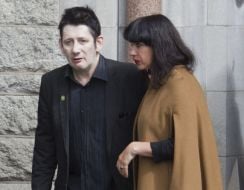The teenager who stabbed Urantsetseg Tserendorj to death wanted to rob not kill her and should be found guilty of manslaughter rather than murder, his barrister has told the Central Criminal Court.
Lawyers for the Director of Public Prosecutions (DPP) and for the 16-year-old accused delivered their brief closing speeches in the trial on Monday morning. Ms Justice Mary Ellen Ring completed her charge to the jury before the seven women and five men began their deliberations. They will return on Tuesday.
Michael O'Higgins SC, for the accused, said that although his client was just 14 years old at the time of the killing, he had developed a drug habit and went out to steal money to buy drugs. He asked the jury to look at CCTV footage of the attack and to consider whether the fatal injury to the deceased's neck could have been accidental or caused by a "moment of clumsiness".
Sean Gillane SC for the DPP said that a person stabbing someone in the neck can only intend to cause serious harm. "That is the only logical conclusion on a cold analysis of the facts," he said, adding "the appropriate verdict is guilty of murder".
The accused, who can't be identified as he is a minor, has pleaded not guilty to the murder of Ms Tserendorj but guilty to her manslaughter on January 29th, 2021. The State did not accept his plea. He has also pleaded guilty to producing a knife and to attempting to rob Ms Tserendorj on a walkway between George’s Dock and Custom House Quay in the IFSC, Dublin on January 20th, 2021.
'I didn't mean to do it'
Before closing speeches, the defence called two witnesses – an aunt and grandmother of the accused. The aunt said that she was in a car with the accused when a radio news report mentioned that a woman had been seriously injured following a stabbing at the IFSC the previous day. She said the accused became "really agitated" and nervous, asked her to turn up the radio volume and then asked to be taken home. When he returned home, she said the accused went to his bedroom.
The boy's grandmother said she had raised the accused from when he was a baby as his mother was a heroin addict. From the age of 12, she said, the boy has been abusing drugs and would steal to pay for his habit.
On January 21st, 2021, one day after the stabbing, the accused told her: "That woman that was stabbed in the IFSC, that was me." The witness said she became upset, as did the accused, who told her: "I didn't mean to do it. I'm going to the police station." He later added: "I didn't know I got her."
In his closing speech Mr Gillane, for the DPP, said that the central issue for the jury is to determine the accused's state of mind when "he did what he undoubtedly did". He said the prosecution case is that the accused made a decision to go out and rob someone with a knife and cycled around Dublin city centre until he came across the Ms Tserendorj, walking home from work alone.
Counsel added: "The decision is taken by him to rob her with that knife. It was his decision to approach her and confront her and it was his decision to produce the knife and his decision to use it." The accused stabbed Ms Tserendorj in the neck just below the ear using a serrated knife, counsel said. "What is the natural and probable consequence of that?" he asked.
"A knife to the neck can only result in serious injury," he said, adding that anyone inflicting such an injury must have intended to cause serious injury and is therefore guilty of murder.
Mr Gillane added: "It is not a happy conclusion but it is the only logical conclusion on a cold analysis of the facts and the appropriate verdict is guilty of murder."
Mr O'Higgins, for the defence, told the jury that if they are satisfied the stabbing was not an accident, they must consider whether the accused intended to cause serious injury or death.
Counsel said his client, who was a child, did not have honourable intentions but had a drug dependency that he paid for by stealing from people. Such crimes are the "bread and butter" of the Circuit Criminal Court, counsel said, and while it is unusual to see a 14-year-old committing such crimes it is not unheard of.
He was looking for a soft target, someone vulnerable, and found Ms Tserendorj walking on her own. "I'm not hiding from that," Mr O'Higgins said, "but I am asking you not to hold it against him any more than you need to to determine his intention or his state of mind. The intention was to get money from a person."
He said robbers generally do not want to seriously injure their target, but want to "get the money as quickly and cleanly as possible". The robbery was not successful, Mr O'Higgins said, but there was no secondary motive to seriously injure the deceased.
He asked the jury to look at the CCTV footage which he said shows that following the encounter Ms Tserendorj walked away, not showing signs of any serious injury, while the accused cycled past her and away. It is a reasonable view that he did not know he had injured her in any significant way, counsel said, and he asked why, if he intended to kill her, did he not act on that before cycling away.
Intoxicated
Mr O'Higgins said that a security guard told the trial that at around the time of the stabbing a youth matching the accused's description approached him looking for a cigarette and was clearly intoxicated. Mr O'Higgins asked the jury to consider the impact intoxication would have on a 14-year-old's coordination, and whether he could have been so intoxicated that he could not have formed an intent.
He said the accused's reaction when he heard about the stabbing on the news suggests that he did not intend to seriously injure Ms Tserendorj. Counsel also reminded the jury that Assistant State Pathologist Dr Heidi Okkers told the trial that there was an "element of misfortune" in the injury that partially severed the deceased's internal carotid artery.

He said the accused did not "charge in" and strike Ms Tserendorj with maximum force in the neck. There were "flailing arms and moving around", he said, and it is hard to tell if the injury was inflicted accidentally or in a "moment of clumsiness with no decision underpinning it".
Mr O'Higgins reminded the jury that they hold the life of a 14-year-old in their hands and must consider the evidence in a fair way, not with sympathy but with human compassion and wisdom. By pleading guilty to manslaughter, he said the accused has taken responsibility for what he did and the appropriate verdict is one of manslaughter and not murder.
Ms Justice Mary Ellen Ring told the jury that the prosecution must prove its case beyond reasonable doubt and if the jurors are not satisfied that the accused intended to kill or cause serious injury then the appropriate verdict is manslaughter. If they are satisfied beyond a reasonable doubt that he intended to kill or cause serious harm to Ms Tserendorj, then they must find him guilty of murder.
The jury will return to the Central Criminal Court on Tuesday to continue deliberating.







